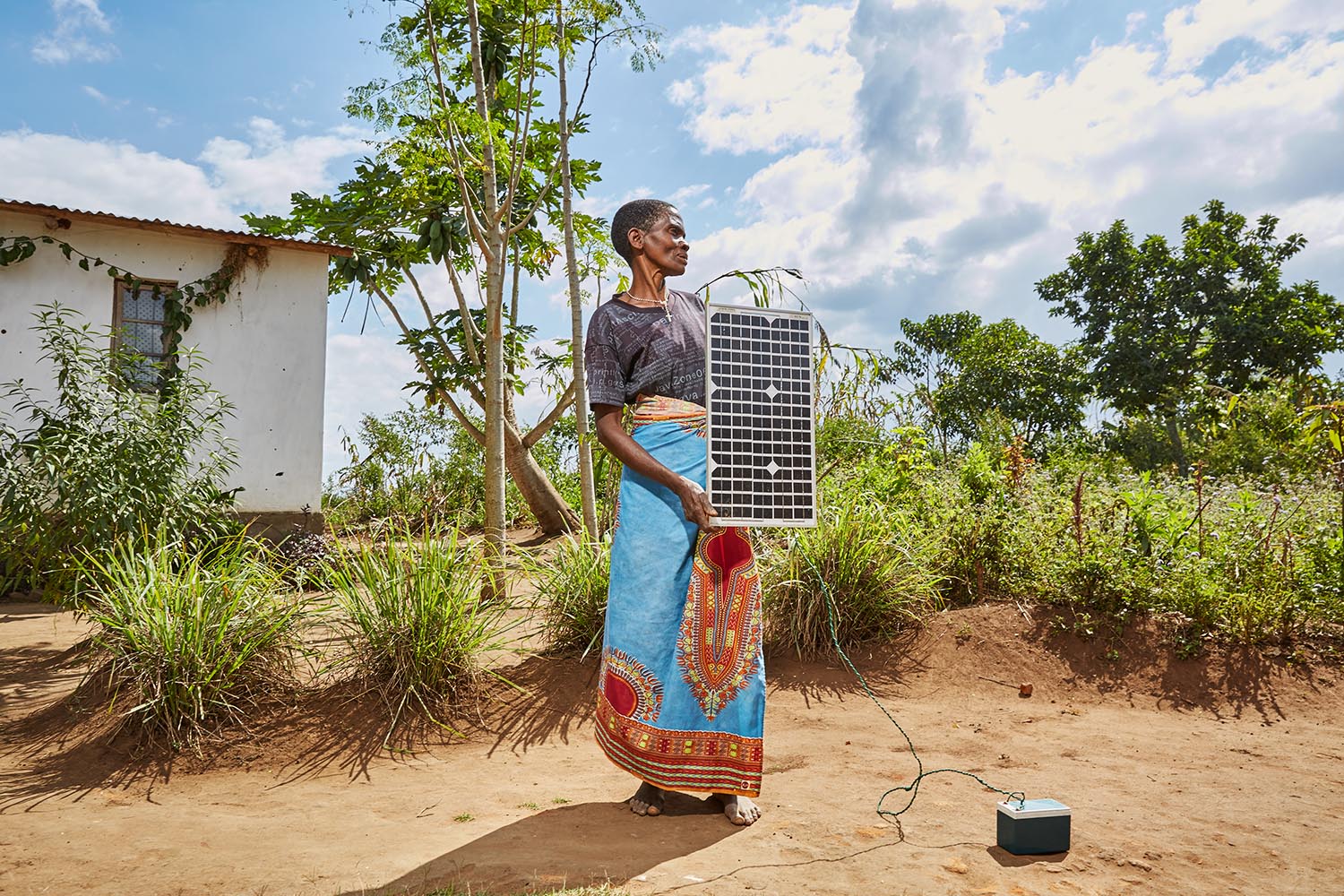
Violet Napazi, 57, holds up the solar panel owned by her son, Luchenza, Malawi, 2017.
Charging mobile phones is becoming a profitable business, especially since solar panels are becoming cheaper to buy and build. Until recently, Violet’s family used the solar panel to charge a battery which was then to used charge mobile phones. But since the inverter burnt out, it can only power one phone at a time.
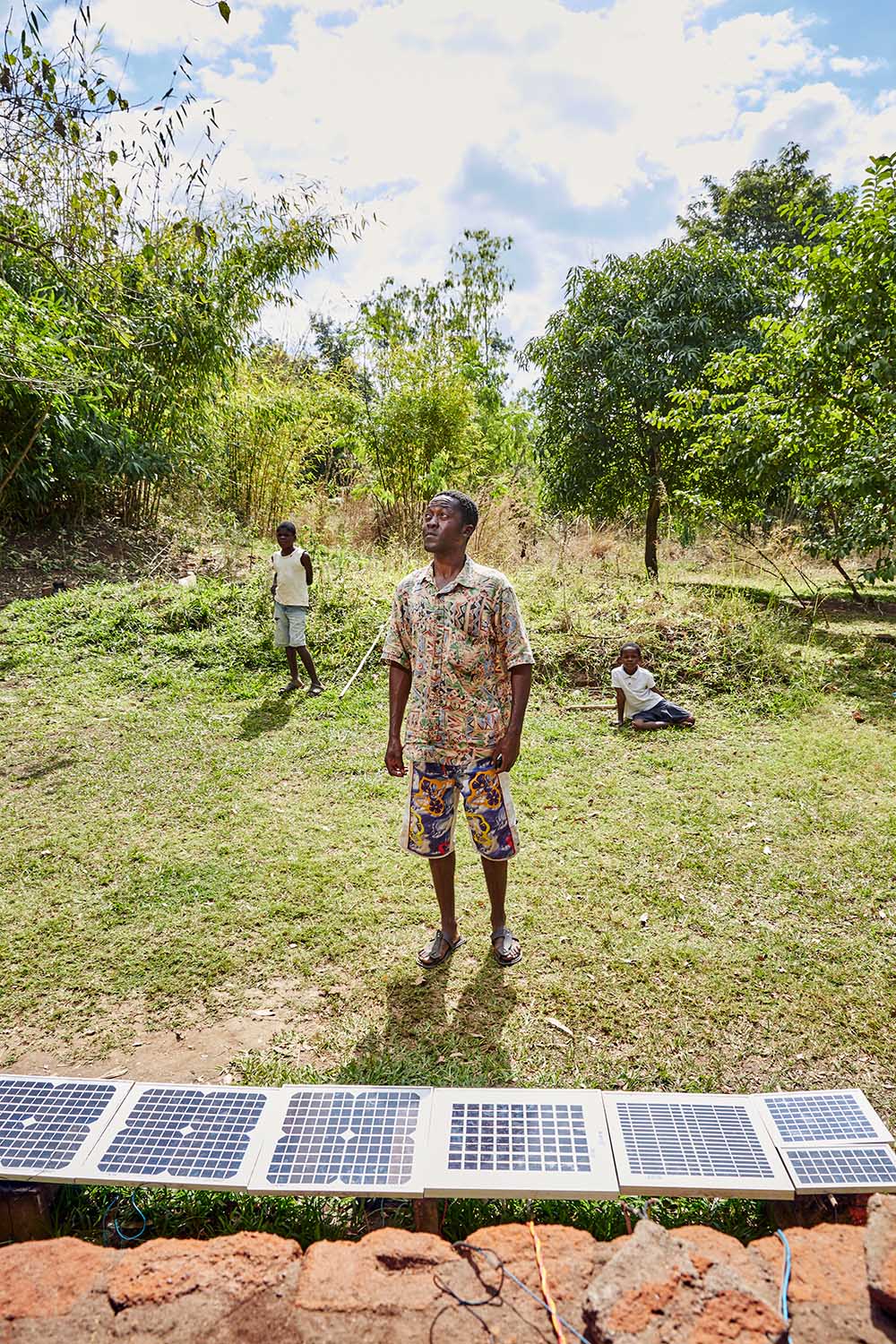
Felix Wonga (29) waits for the sun to appear from behind a cloud, Luchenza, Malawi, 2017.
Customers pay up to 50 Kwatcha (7 cents) to charge their phones using the electricity generated by Felix’s solar panels. Felix is saving to buy a set of bigger panels that provide enough power to ensure a continuous supply of electricity. With his current panels, if the sun is blocked by a cloud, the power stops.
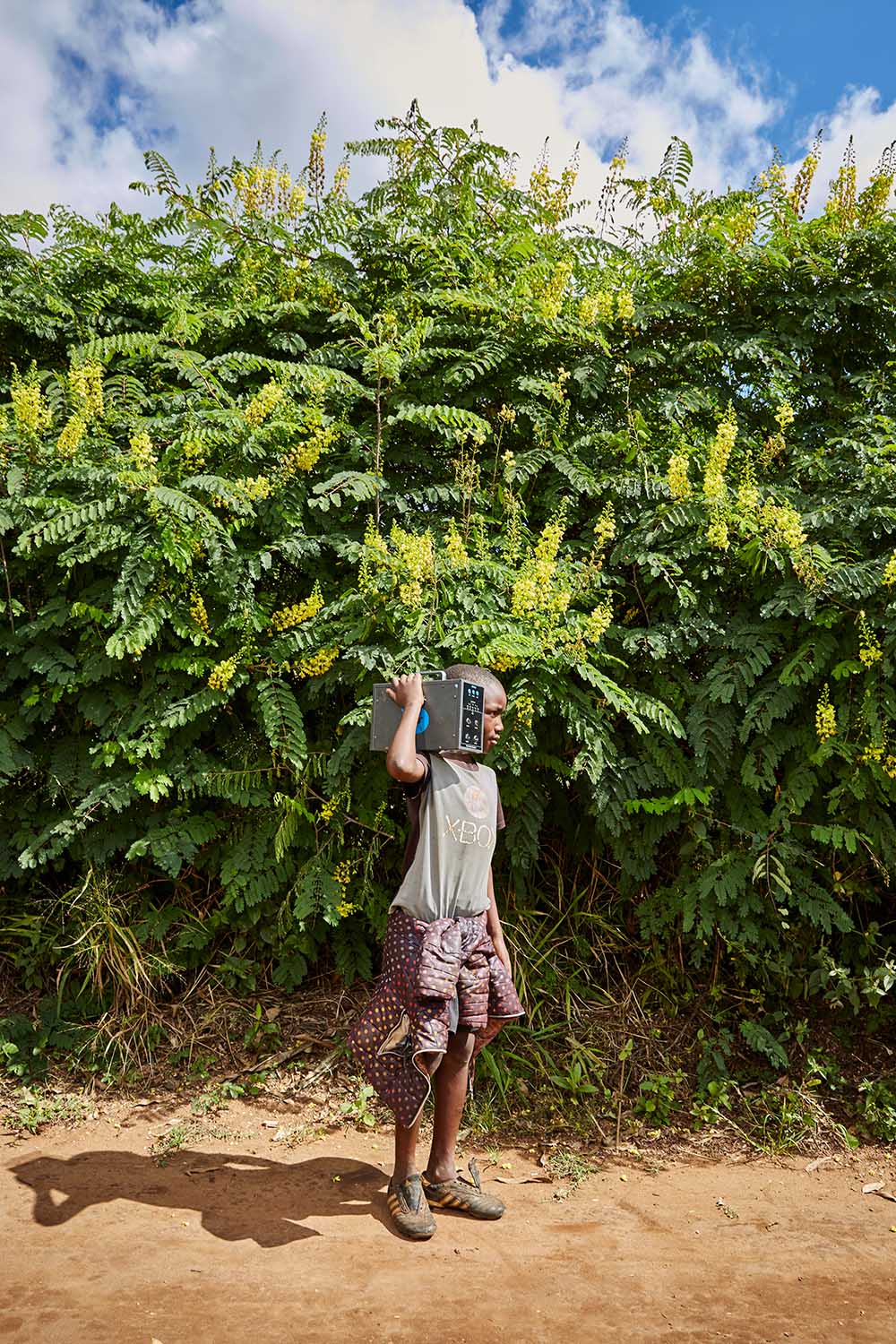
Ben Chumba (10) carries a solar battery home, Chiuta village, Malawi, 2017.
He and his brother return an empty battery and change it for a new one every four days, depending on how much electricity the family uses.
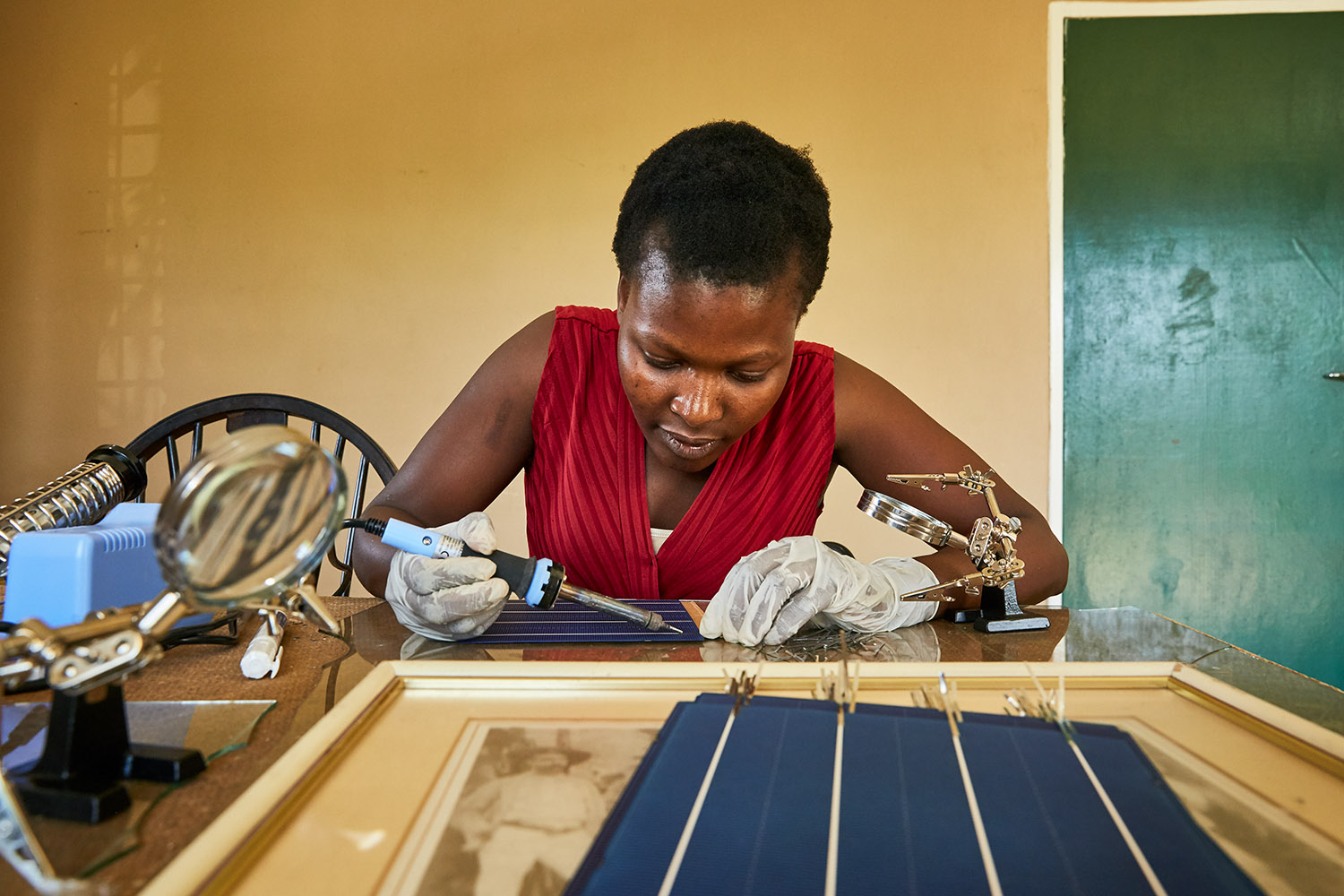
Jennifer, student at Green Malata, learn how to assemble solar panels, Luchenza, Malawi, 2017.
Green Malata teaches a variety of renewable energy skills, including solar panel building and maintenance, biogas generation, and wind turbines.
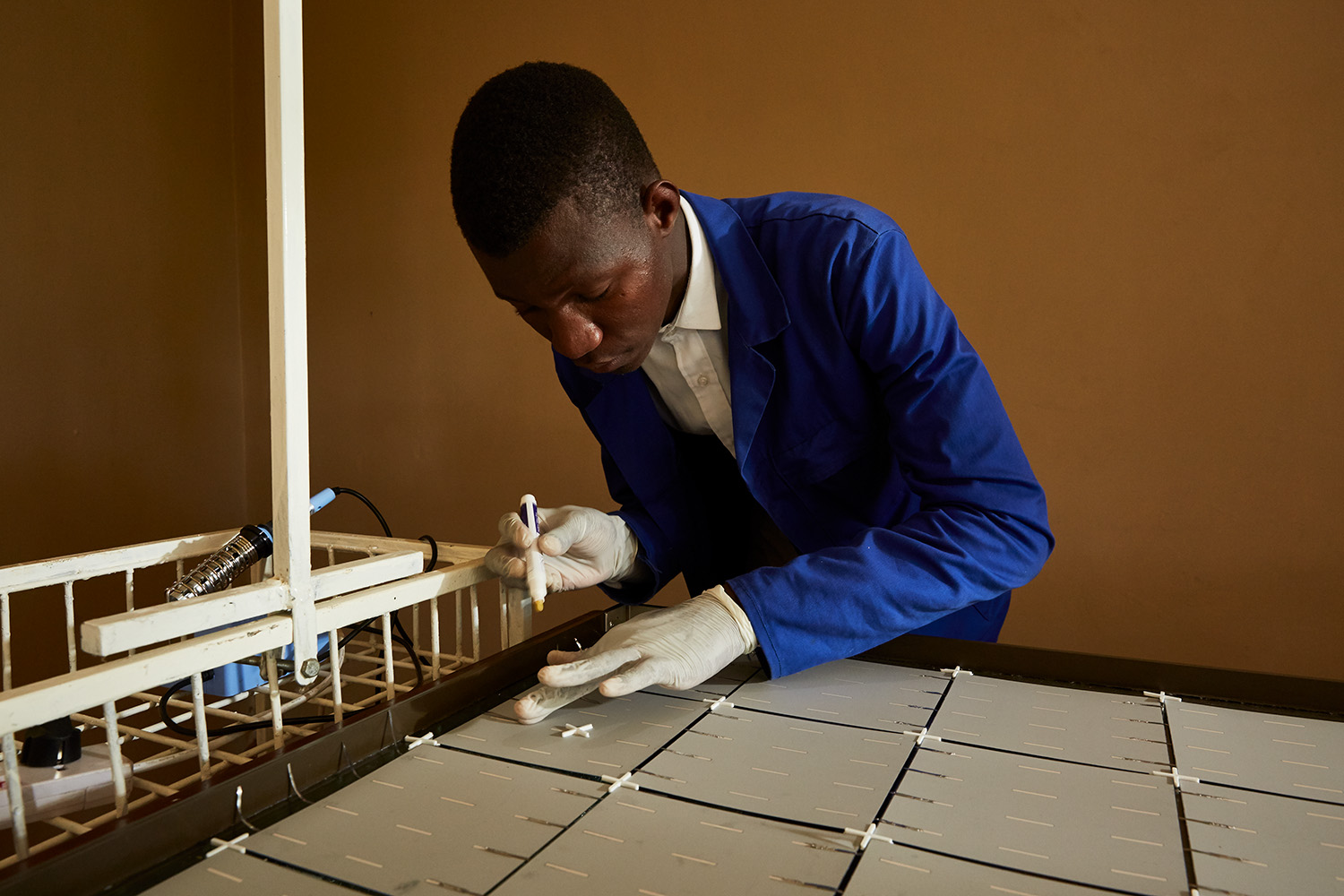
Thomas, a student at Green Malata, an entrepreneurial village, carefully solders metal strips to the back of a solar panel, Luchenza, Malawi, 2017.
Thomas and his fellow students are part of Green Malata’s Renewable Energy course, during which they learn about a range of different green alternatives to on-grid electricity generation.
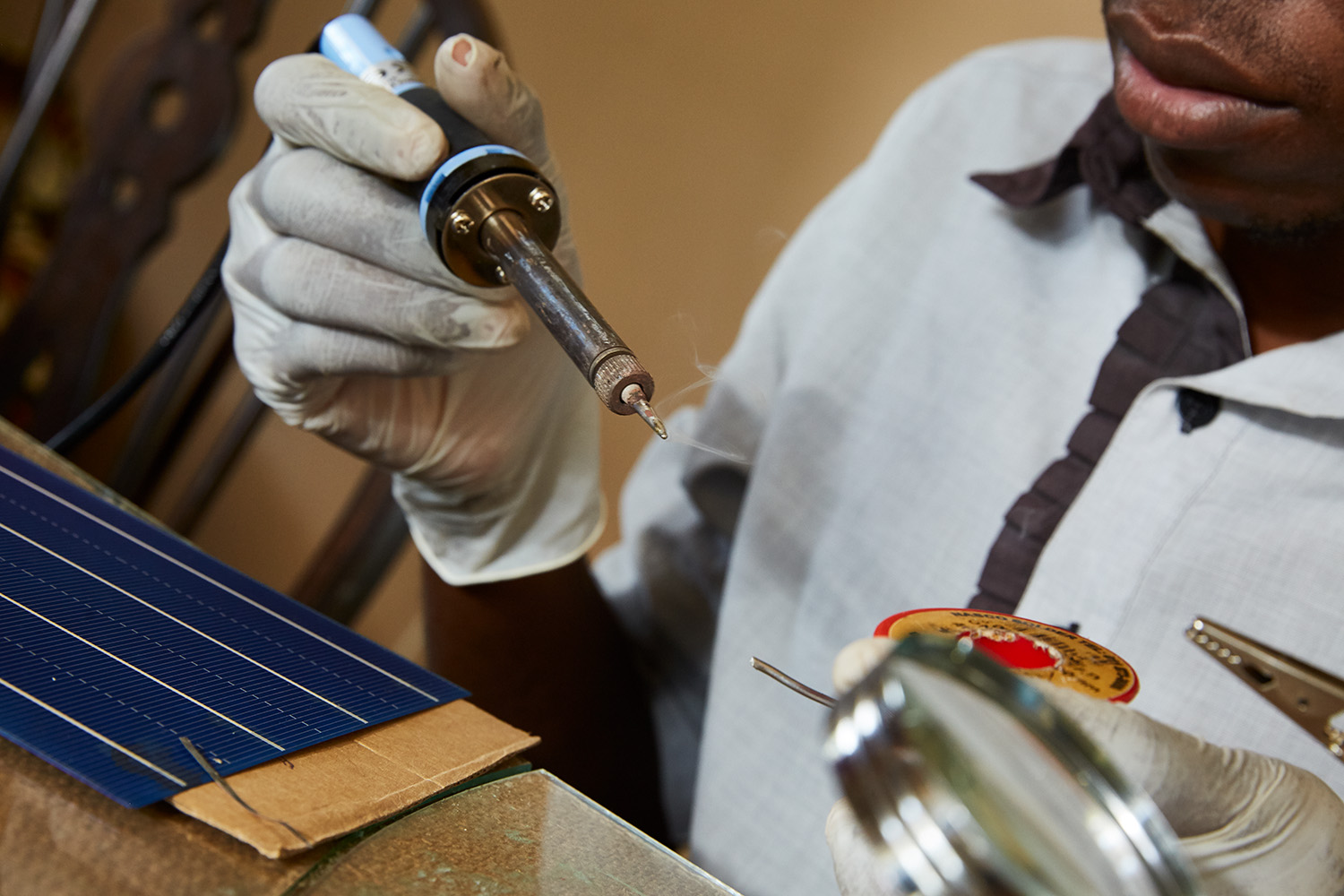
Alex, student at Green Malata, learn how to assemble solar panels, Luchenza, Malawi, 2017.
As solar panel technology becomes cheaper and easier to use, training villages like Green Malata can afford to not only use them as part of their curriculum, but also to sell and rent them out to local villagers, providing much needed extra income.
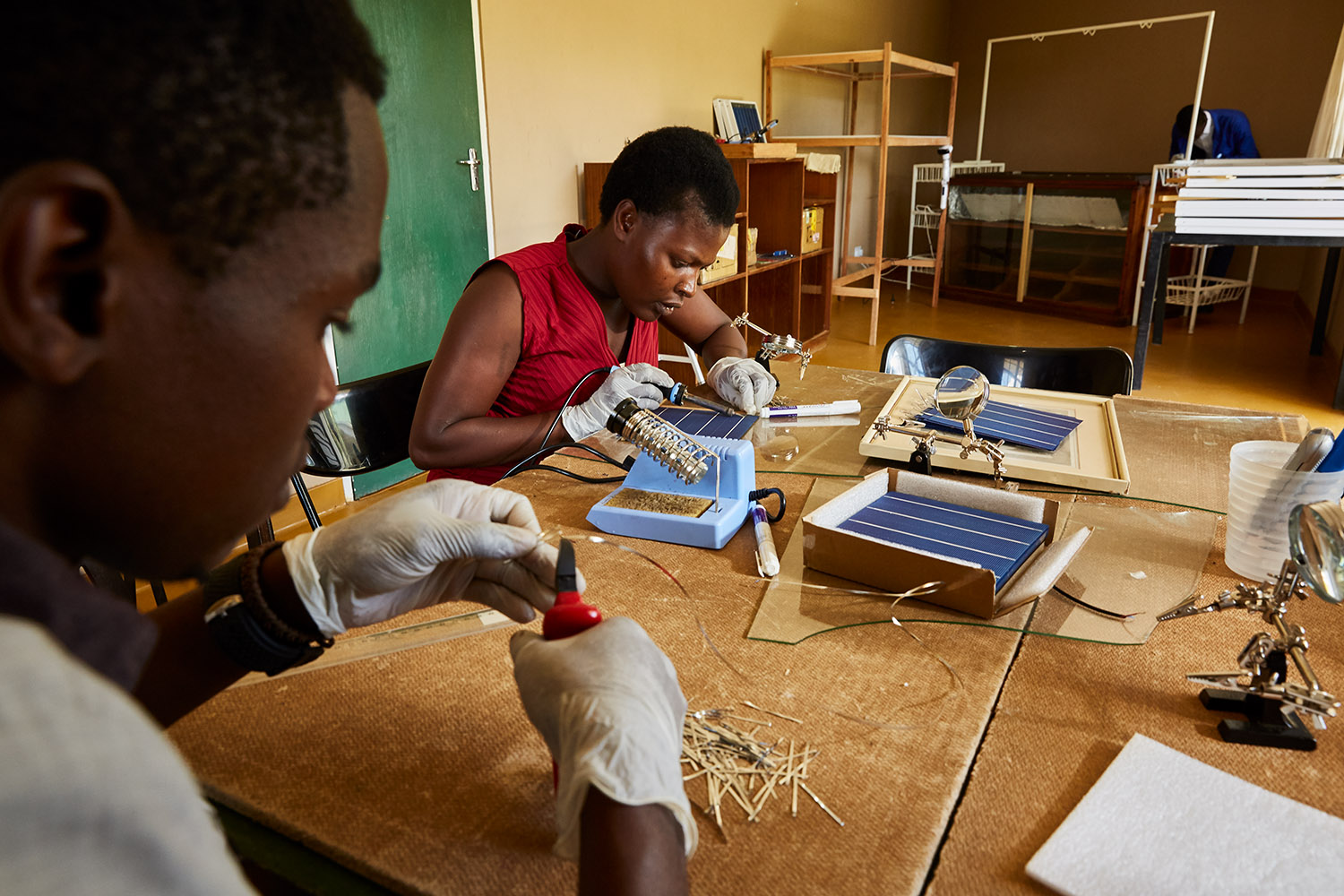
Alex and Jennifer, students at Green Malata, learn how to assemble solar panels, Luchenza, Malawi, 2017.
Green Malata teaches a variety of renewable energy skills, including solar panel building and maintenance, biogas generation, and wind turbines.
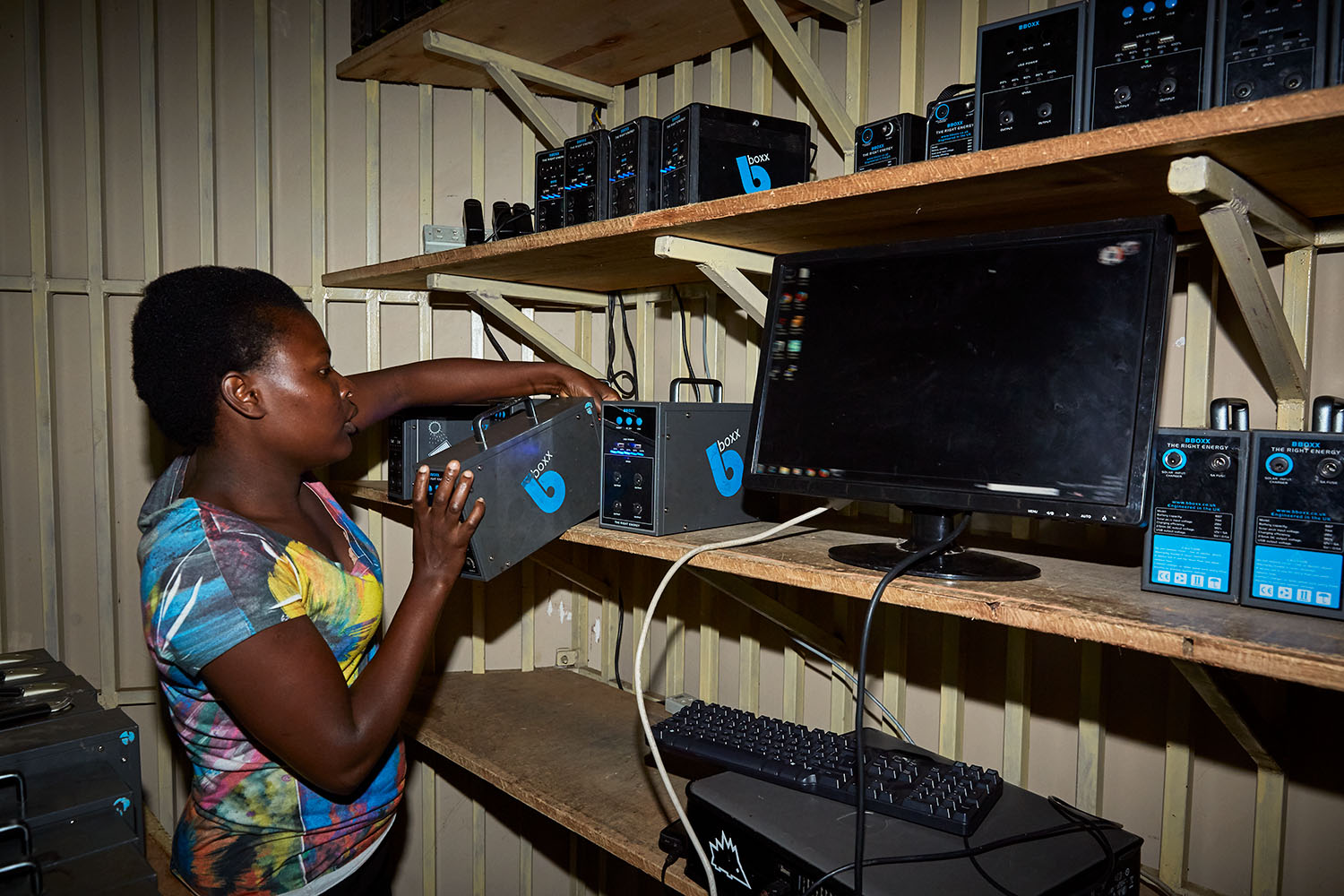
Jennifer, student at Green Malata, works at the electric kiosk, where solar batteries are rented out to the communities, Luchenza, Malawi, 2017.
Green Malata, an entrepreneurial training village that offers a variety of green alternatives to Malawi’s notoriously unreliable national electricity provider, ESCOM.
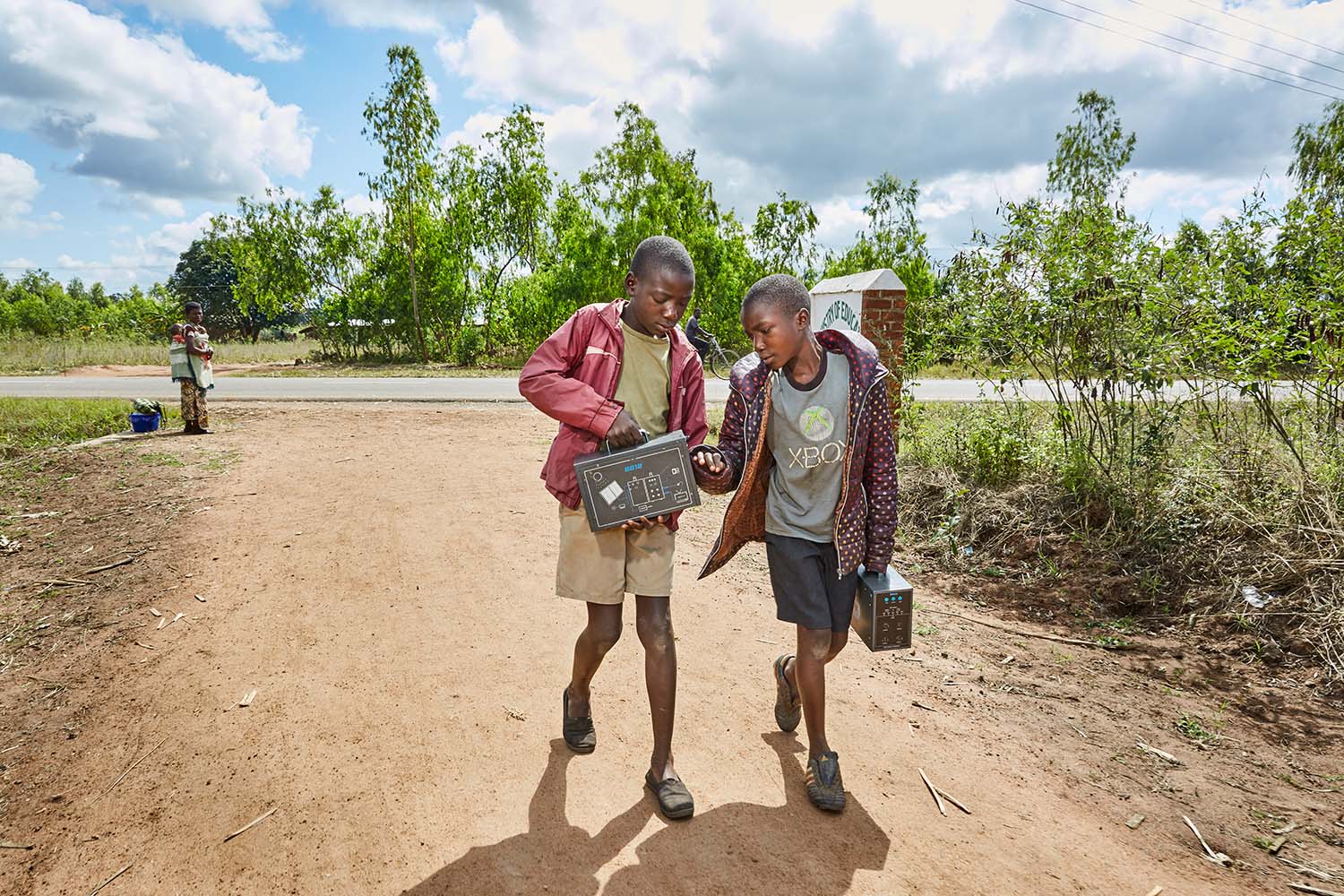
From left to right: Jan Chumba (12) and his brother Ben (10) carry two solar batteries home, after picking them up at Green Malata, an entrepreneurial training village that offers a variety of green alternatives to Malawi’s notoriously unreliable national electricity provider, ESCOM, Luchenza, Malawi, 2017.
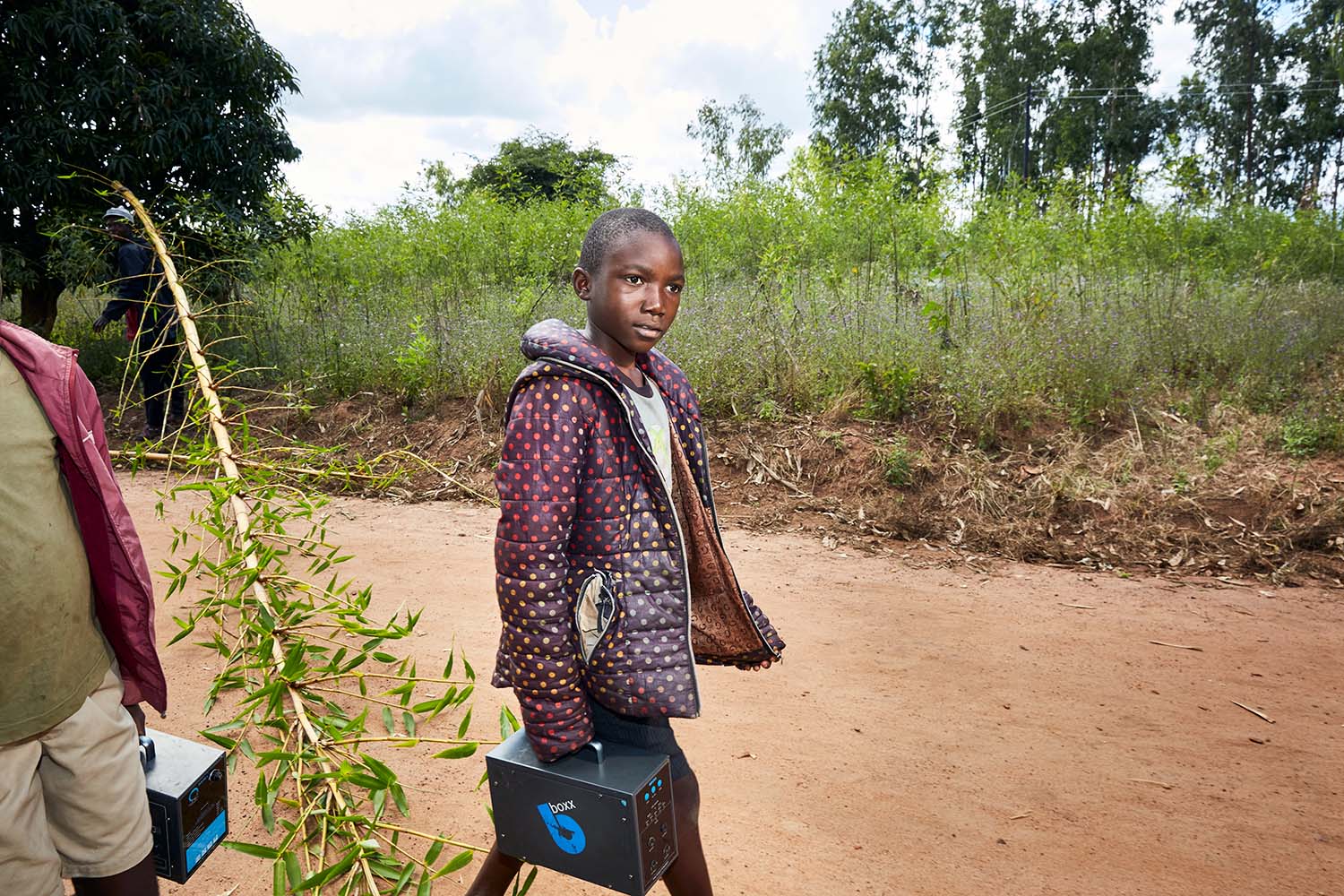
Ben (10) and his brother Jan Chumba (12) carry two solar batteries home, after picking them up at Green Malata, an entrepreneurial training village, Luchenza, Malawi, 2017.
The batteries come in a variety of sizes. The one pictured here costs 2,500 Kwatcha ($3,40) to rent per month, and an additional 1,250 Kwatcha ($1,70) to charge. This particular battery can charge phones, power 5 light bulbs, a radio, fan, and television for up to 4 days.
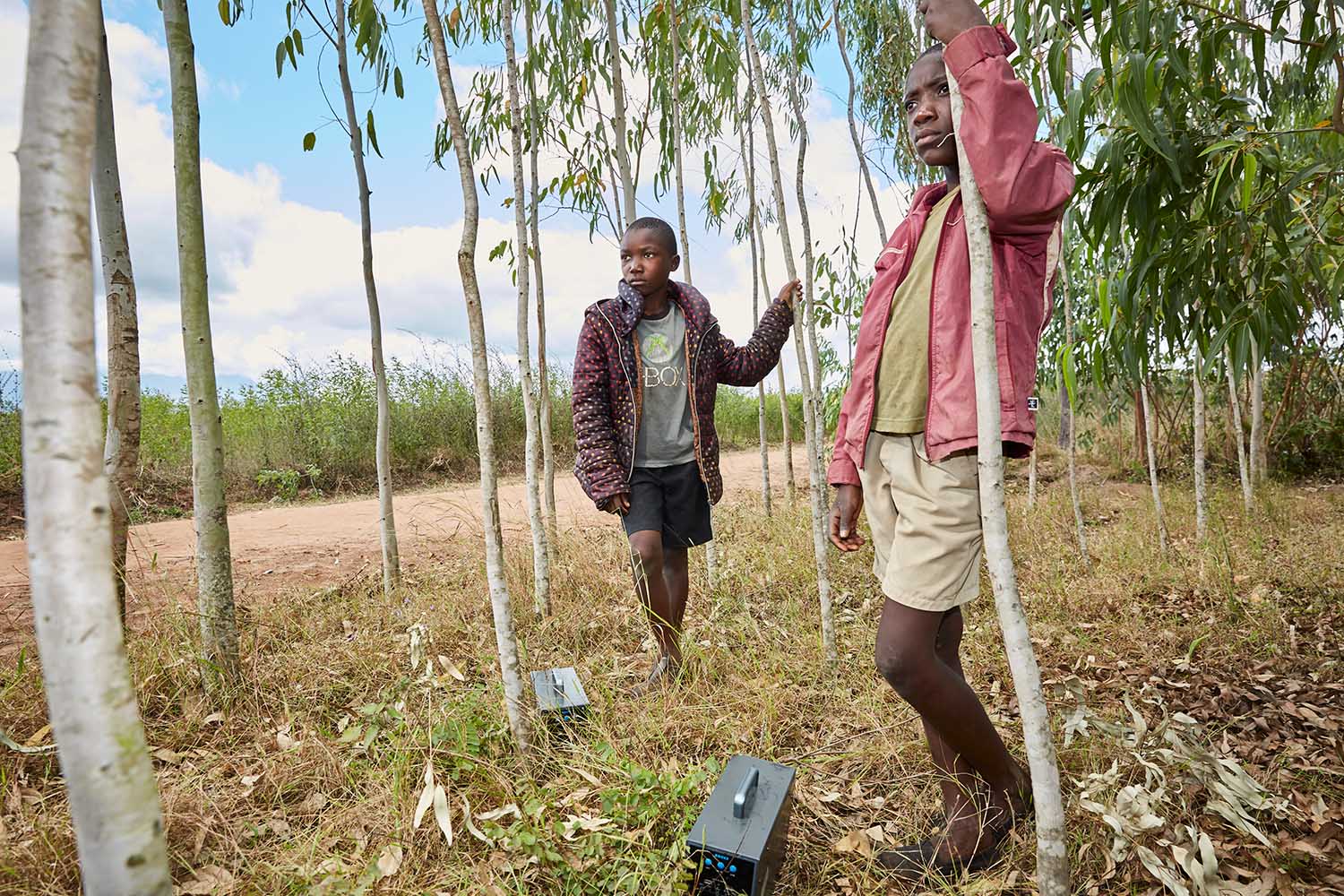
Jan Chumba (12) and his brother Ben (10) carry two solar batteries home, after picking them up at Green Malata, an entrepreneurial training village, Luchenza, Malawi, 2017.
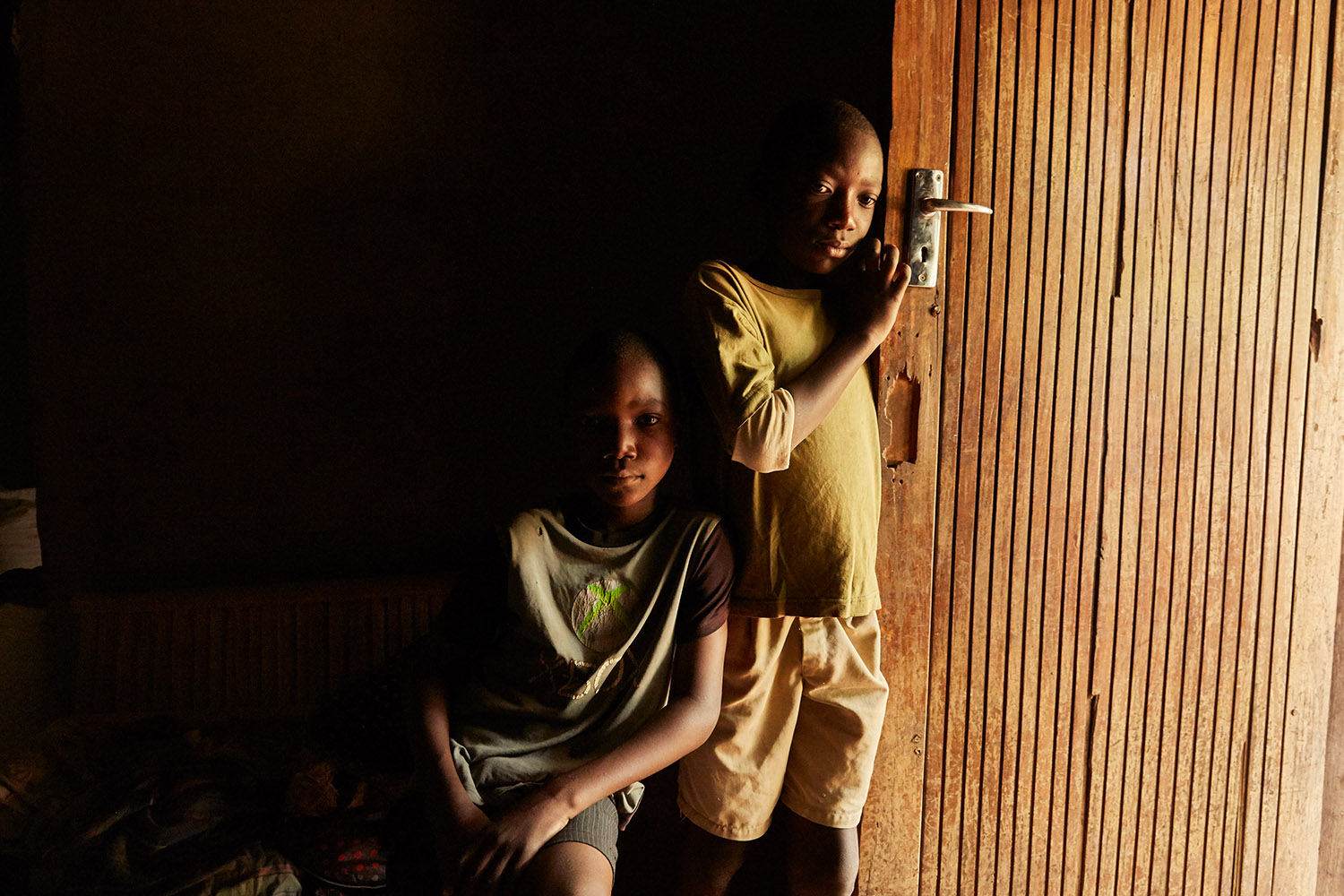
Jan Chumba (12) and his brother Ben (10) in the doorway of their home, Chiuta village, Malawi, 2017.
During the day, the only light inside comes from the open door and windows.
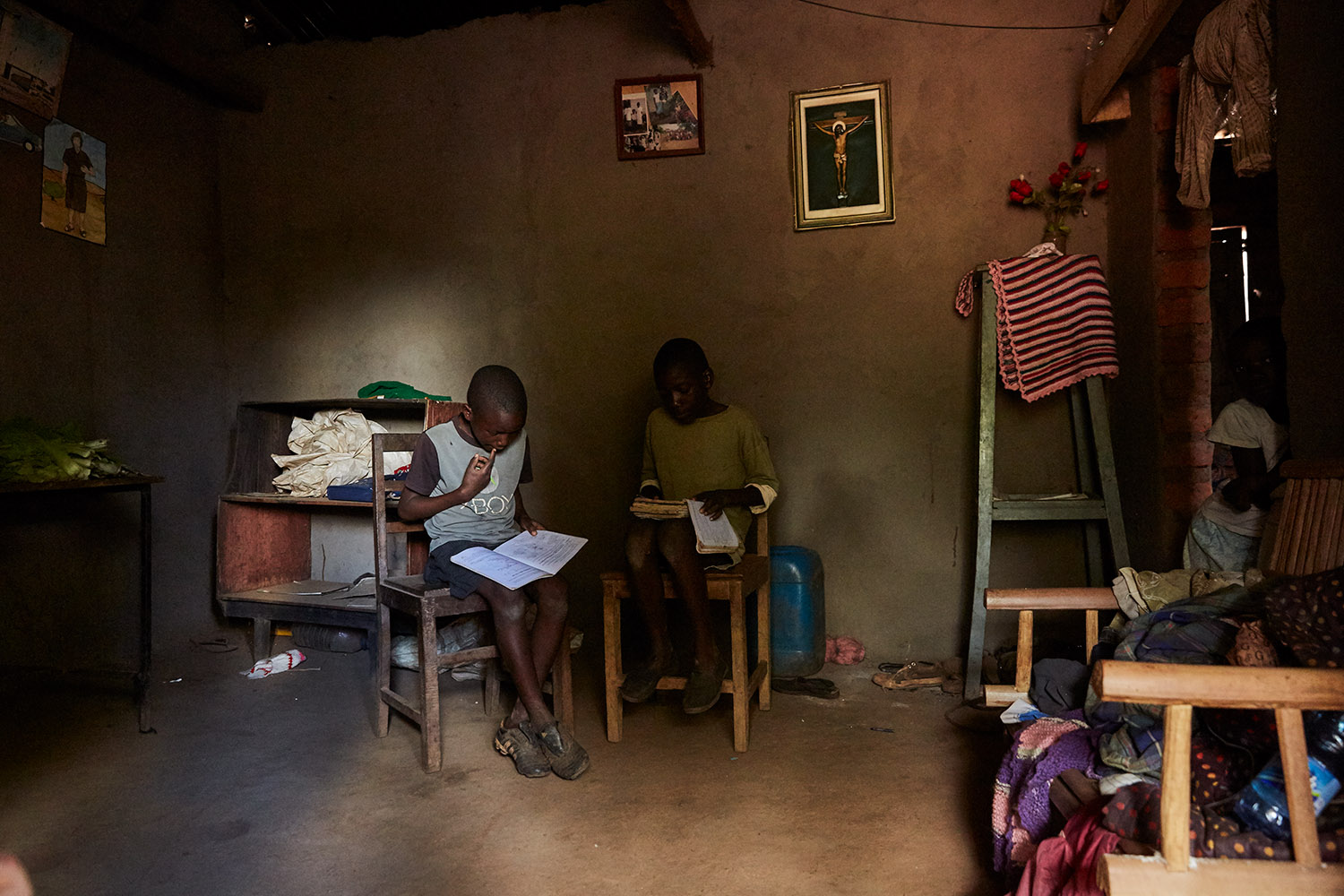
Jan Chumba (12) and his brother Ben (10) studying at home with the daylight that falls into their home, Luchenza, Malawi, 2017.
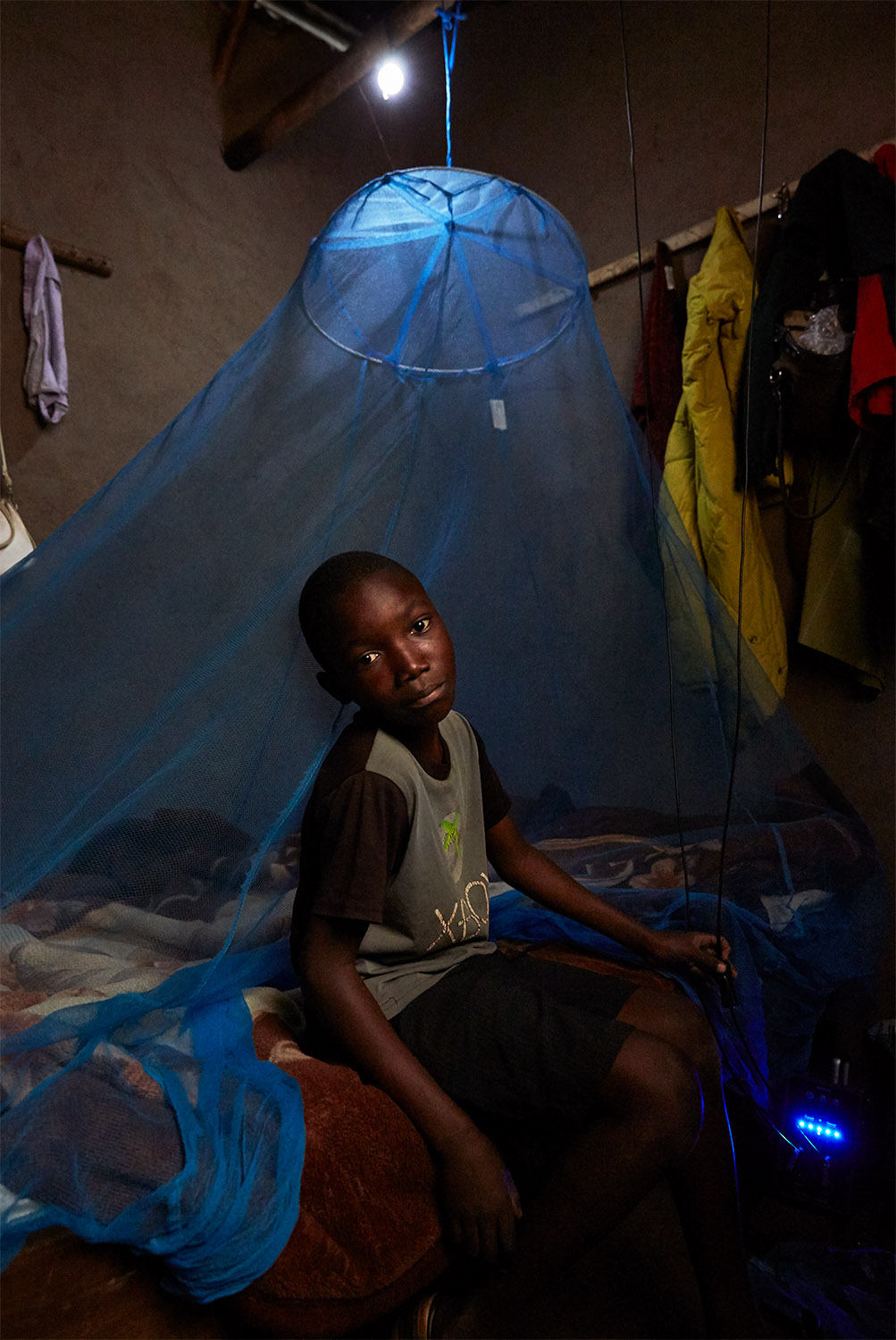
Ben Chumba (10) sits on his bed, lit by a light bulb which is powered by a solar battery, visible in the bottom right hand corner of the image, Chuita village, Malawi, 2017.
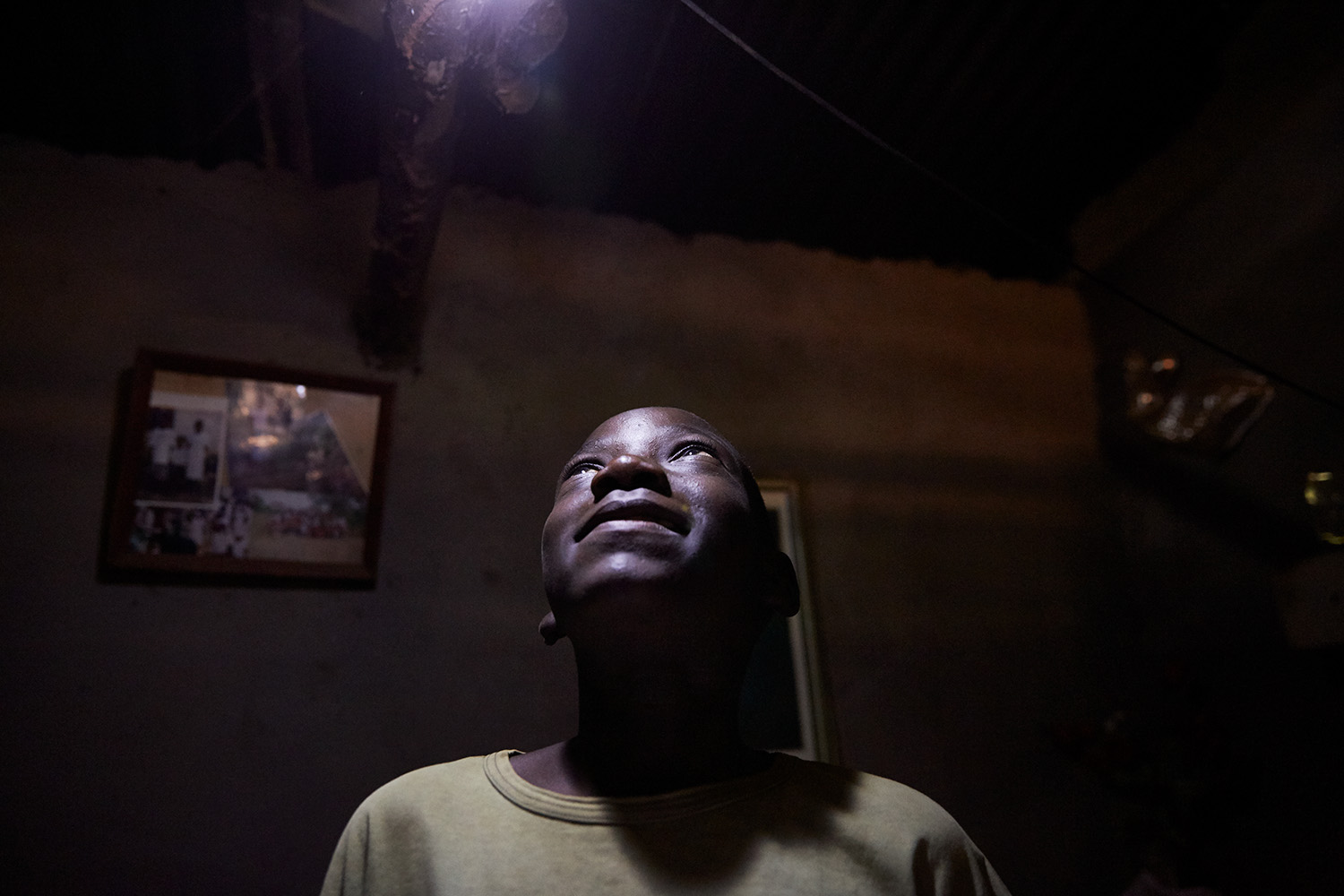
Jan Chumba (12) looks up at the solar battery run light at his home, Luchenza, Malawi, 2017.
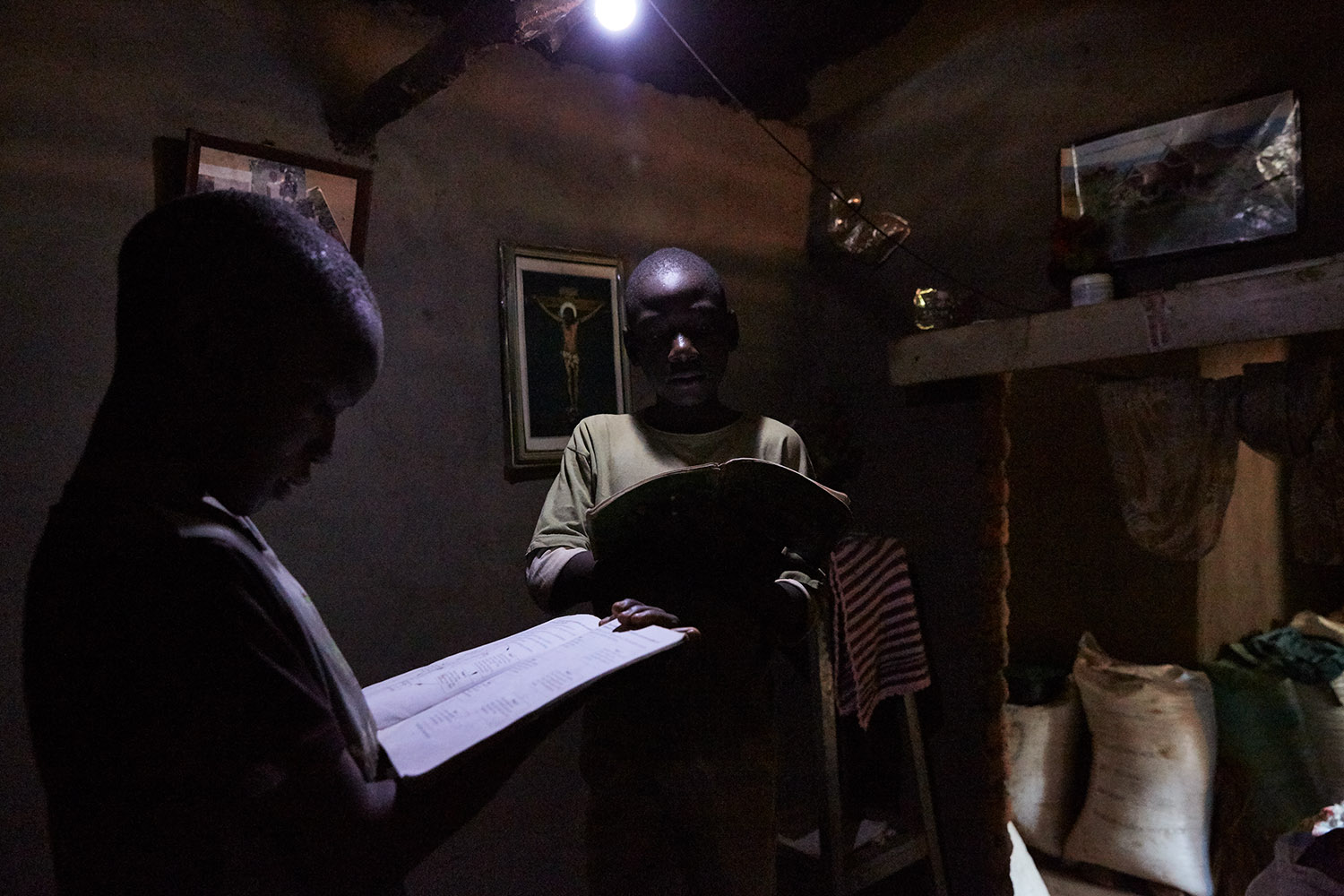
Jan Chumba (12) and his brother Ben (10) studying at home with the solar battery powered light, Luchenza, Malawi, 2017.
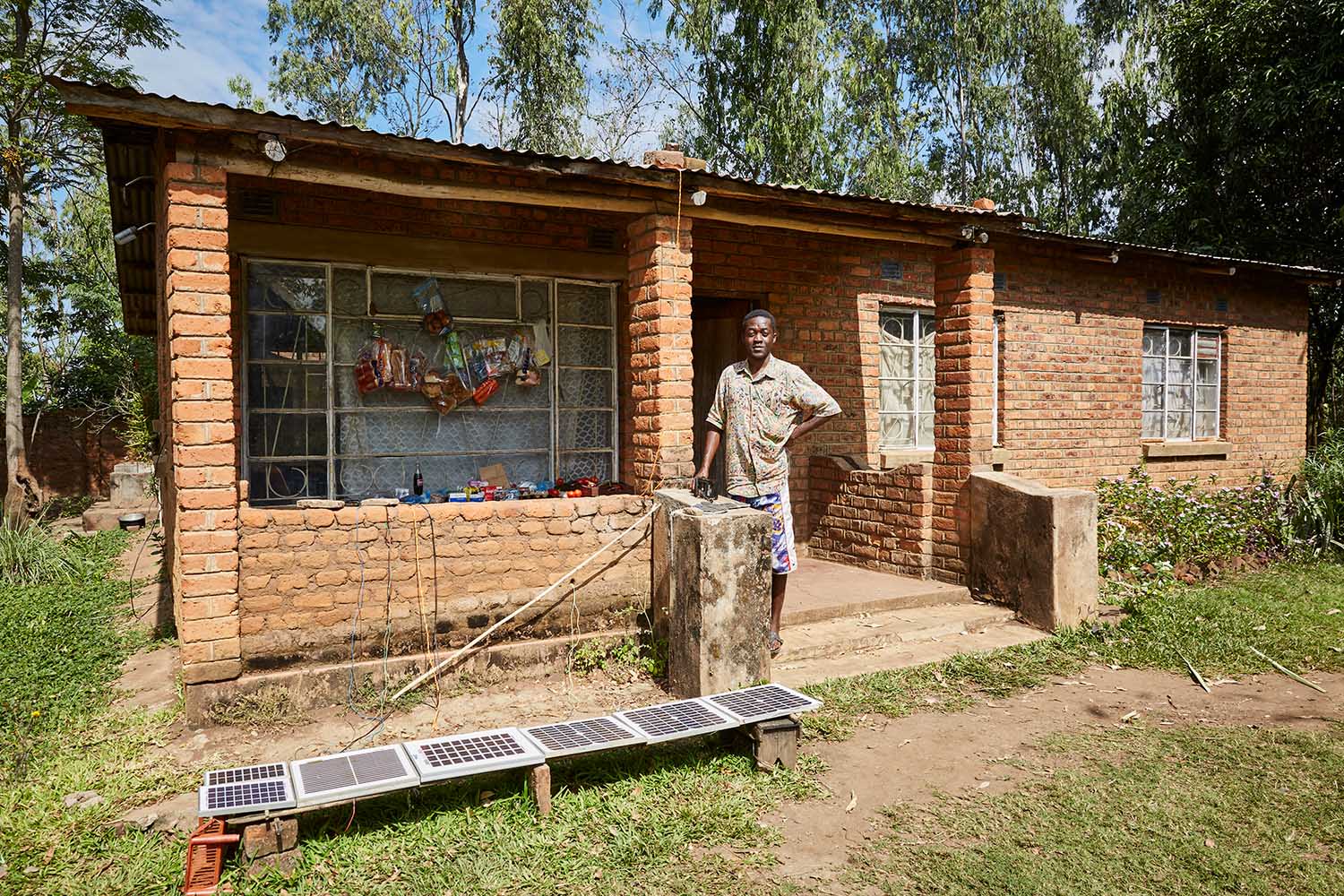
Felix Wonga (29) stands next to the small store he runs with his father, Robert (56), Luchenza, Malawi, 2017.
Felix runs the mobile phone charging business, while his father takes care of the shop front. The solar panels laid out in front of the store power a car battery which, Felix uses to charge up to five mobile phones at once. Because Felix and Robert’s home is the only one in the area with solar panels, business is good.
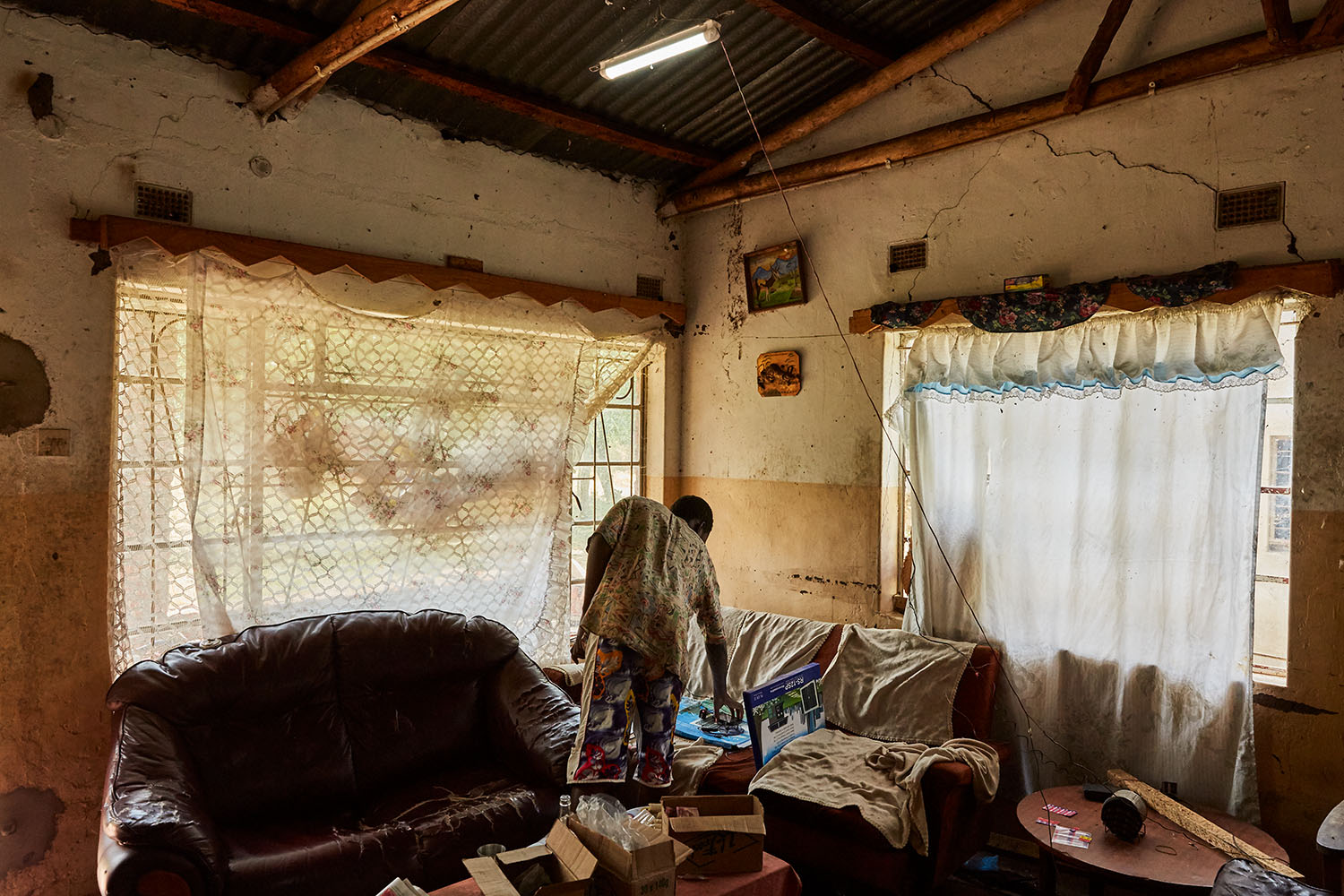
Felix (29) stands in the living room of his home, Luchenza, Malawi, 2017.
The solar panels that Felix uses for his mobile phone charging business also powers their lights, and several small radio’s and speakers. Felix: “We are the only ones in this area that have a charging business. If more people in this area had solar panels it would very much improve their lives. ESCOM [the national provider], is too expensive and not reliable.”
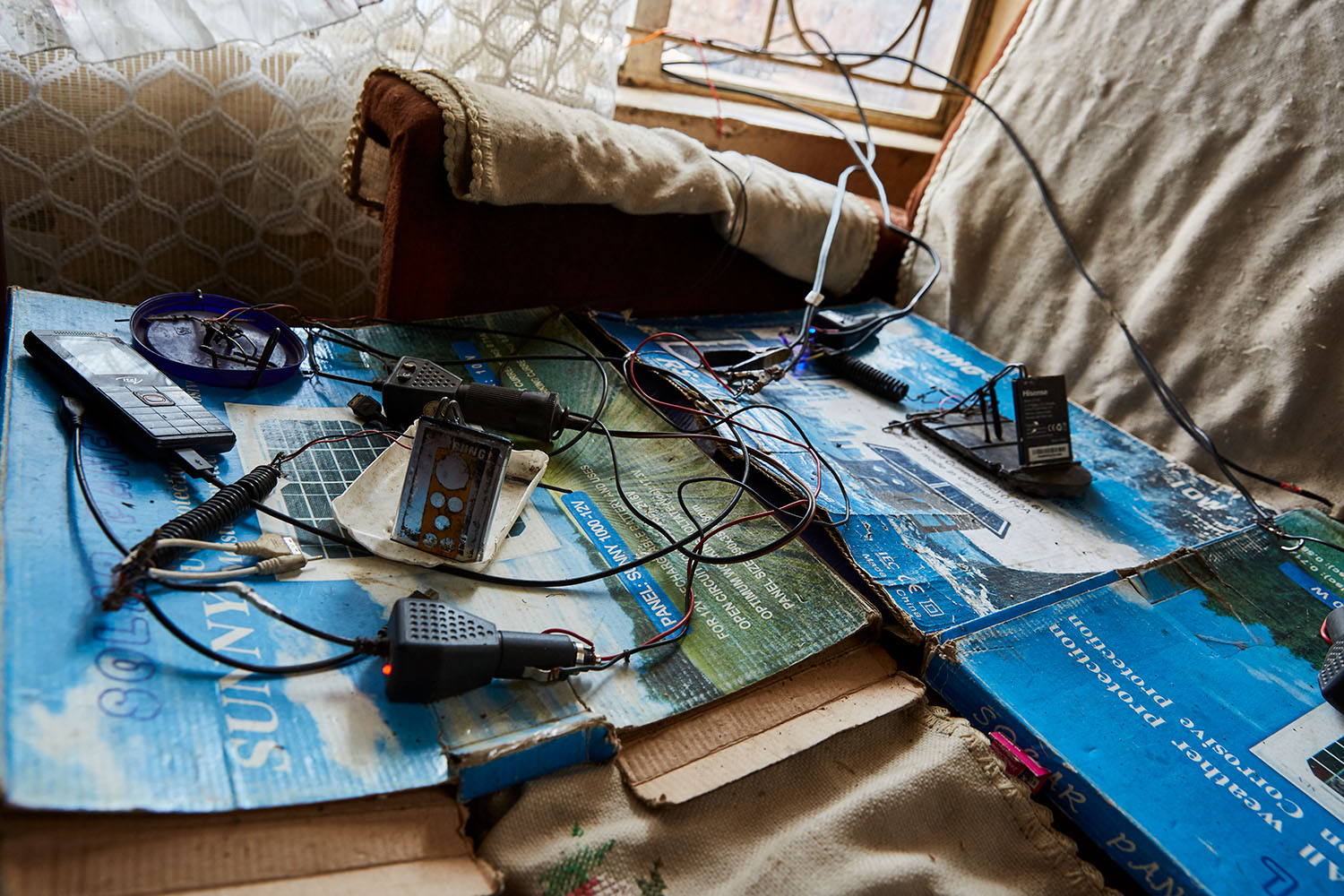
The charging station in the living room of Felix Wonga’s home, Luchenza, Malawi, 2017.
The solar panels that Felix uses for his mobile phone charging business also powers their lights, and several small radio’s and speakers. Felix: “We are the only ones in this area that have a charging business. If more people in this area had solar panels it would very much improve their lives. ESCOM [the national provider], is too expensive and not reliable.”
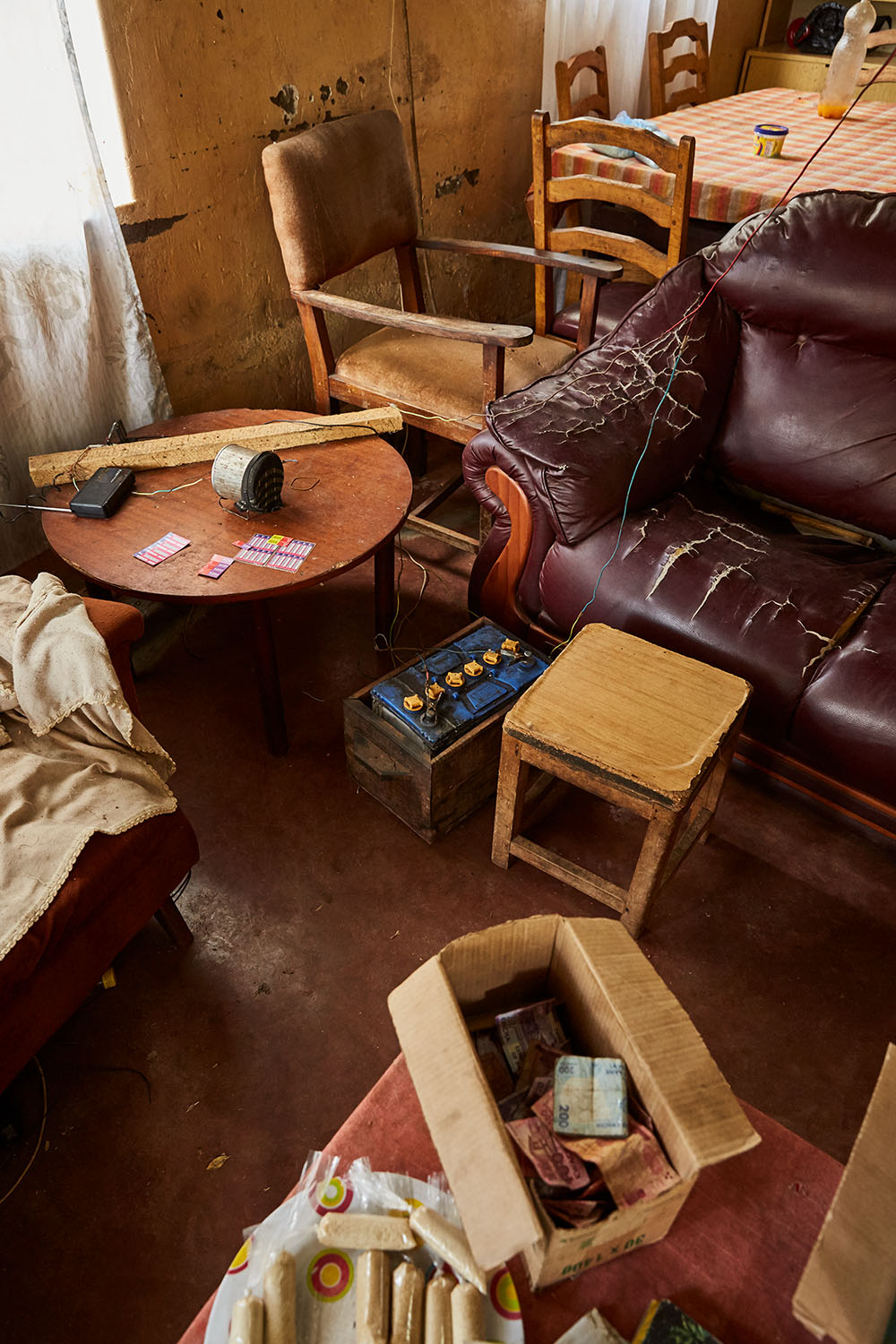
The living room of Felix Wonga’s home, Luchenza, Malawi, 2017.
The solar panels that Felix uses for his mobile phone charging business also powers their lights, and several small radio’s and speakers. Felix: “We are the only ones in this area that have a charging business. If more people in this area had solar panels it would very much improve their lives. ESCOM [the national provider], is too expensive and not reliable.”




















Violet Napazi, 57, holds up the solar panel owned by her son, Luchenza, Malawi, 2017.
Charging mobile phones is becoming a profitable business, especially since solar panels are becoming cheaper to buy and build. Until recently, Violet’s family used the solar panel to charge a battery which was then to used charge mobile phones. But since the inverter burnt out, it can only power one phone at a time.
Felix Wonga (29) waits for the sun to appear from behind a cloud, Luchenza, Malawi, 2017.
Customers pay up to 50 Kwatcha (7 cents) to charge their phones using the electricity generated by Felix’s solar panels. Felix is saving to buy a set of bigger panels that provide enough power to ensure a continuous supply of electricity. With his current panels, if the sun is blocked by a cloud, the power stops.
Ben Chumba (10) carries a solar battery home, Chiuta village, Malawi, 2017.
He and his brother return an empty battery and change it for a new one every four days, depending on how much electricity the family uses.
Jennifer, student at Green Malata, learn how to assemble solar panels, Luchenza, Malawi, 2017.
Green Malata teaches a variety of renewable energy skills, including solar panel building and maintenance, biogas generation, and wind turbines.
Thomas, a student at Green Malata, an entrepreneurial village, carefully solders metal strips to the back of a solar panel, Luchenza, Malawi, 2017.
Thomas and his fellow students are part of Green Malata’s Renewable Energy course, during which they learn about a range of different green alternatives to on-grid electricity generation.
Alex, student at Green Malata, learn how to assemble solar panels, Luchenza, Malawi, 2017.
As solar panel technology becomes cheaper and easier to use, training villages like Green Malata can afford to not only use them as part of their curriculum, but also to sell and rent them out to local villagers, providing much needed extra income.
Alex and Jennifer, students at Green Malata, learn how to assemble solar panels, Luchenza, Malawi, 2017.
Green Malata teaches a variety of renewable energy skills, including solar panel building and maintenance, biogas generation, and wind turbines.
Jennifer, student at Green Malata, works at the electric kiosk, where solar batteries are rented out to the communities, Luchenza, Malawi, 2017.
Green Malata, an entrepreneurial training village that offers a variety of green alternatives to Malawi’s notoriously unreliable national electricity provider, ESCOM.
From left to right: Jan Chumba (12) and his brother Ben (10) carry two solar batteries home, after picking them up at Green Malata, an entrepreneurial training village that offers a variety of green alternatives to Malawi’s notoriously unreliable national electricity provider, ESCOM, Luchenza, Malawi, 2017.
Ben (10) and his brother Jan Chumba (12) carry two solar batteries home, after picking them up at Green Malata, an entrepreneurial training village, Luchenza, Malawi, 2017.
The batteries come in a variety of sizes. The one pictured here costs 2,500 Kwatcha ($3,40) to rent per month, and an additional 1,250 Kwatcha ($1,70) to charge. This particular battery can charge phones, power 5 light bulbs, a radio, fan, and television for up to 4 days.
Jan Chumba (12) and his brother Ben (10) carry two solar batteries home, after picking them up at Green Malata, an entrepreneurial training village, Luchenza, Malawi, 2017.
Jan Chumba (12) and his brother Ben (10) in the doorway of their home, Chiuta village, Malawi, 2017.
During the day, the only light inside comes from the open door and windows.
Jan Chumba (12) and his brother Ben (10) studying at home with the daylight that falls into their home, Luchenza, Malawi, 2017.
Ben Chumba (10) sits on his bed, lit by a light bulb which is powered by a solar battery, visible in the bottom right hand corner of the image, Chuita village, Malawi, 2017.
Jan Chumba (12) looks up at the solar battery run light at his home, Luchenza, Malawi, 2017.
Jan Chumba (12) and his brother Ben (10) studying at home with the solar battery powered light, Luchenza, Malawi, 2017.
Felix Wonga (29) stands next to the small store he runs with his father, Robert (56), Luchenza, Malawi, 2017.
Felix runs the mobile phone charging business, while his father takes care of the shop front. The solar panels laid out in front of the store power a car battery which, Felix uses to charge up to five mobile phones at once. Because Felix and Robert’s home is the only one in the area with solar panels, business is good.
Felix (29) stands in the living room of his home, Luchenza, Malawi, 2017.
The solar panels that Felix uses for his mobile phone charging business also powers their lights, and several small radio’s and speakers. Felix: “We are the only ones in this area that have a charging business. If more people in this area had solar panels it would very much improve their lives. ESCOM [the national provider], is too expensive and not reliable.”
The charging station in the living room of Felix Wonga’s home, Luchenza, Malawi, 2017.
The solar panels that Felix uses for his mobile phone charging business also powers their lights, and several small radio’s and speakers. Felix: “We are the only ones in this area that have a charging business. If more people in this area had solar panels it would very much improve their lives. ESCOM [the national provider], is too expensive and not reliable.”
The living room of Felix Wonga’s home, Luchenza, Malawi, 2017.
The solar panels that Felix uses for his mobile phone charging business also powers their lights, and several small radio’s and speakers. Felix: “We are the only ones in this area that have a charging business. If more people in this area had solar panels it would very much improve their lives. ESCOM [the national provider], is too expensive and not reliable.”